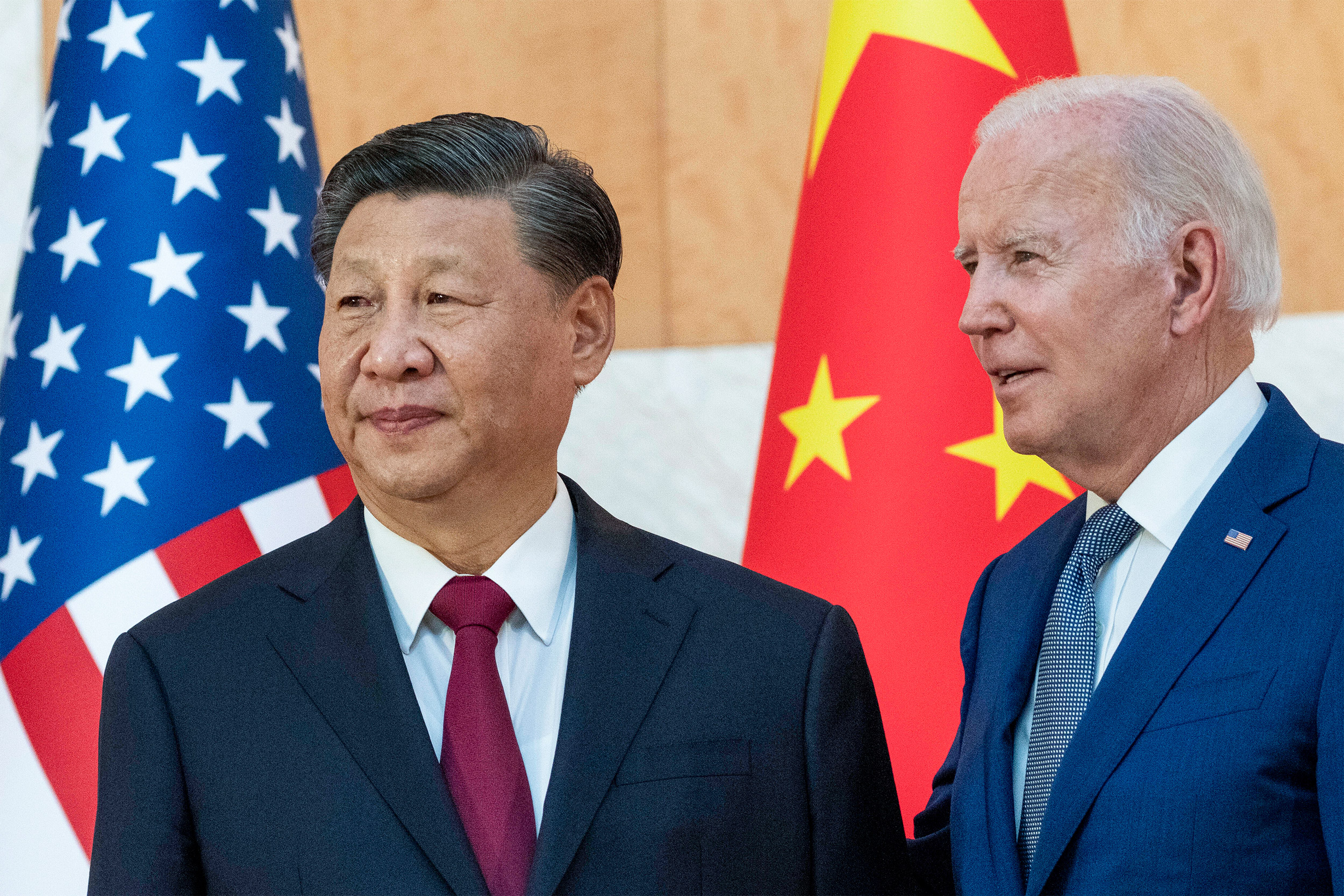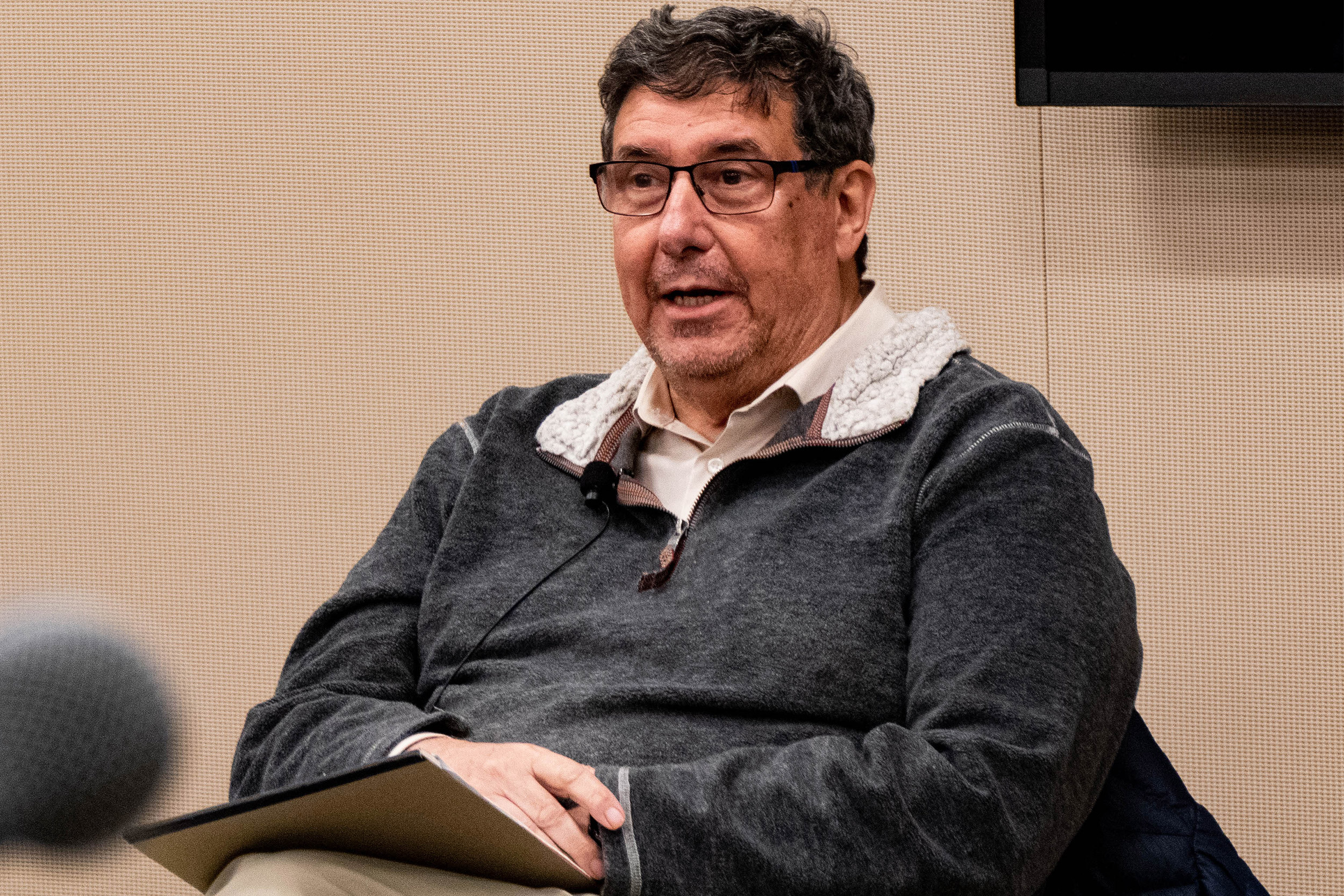
During his visit to the U.S., Chinese President Xi Jinping is expected to meet with President Biden, their first face-to-face meeting in a year.
Alex Brandon/AP file photo
How big a deal is meeting between Biden, Xi? Pretty big
Longtime China watcher Tony Saich says two nations want to stabilize ties a bit amid troubling levels of tension
China President Xi Jinping will be in San Francisco to speak with business leaders attending a gathering of the Asia Pacific Economic Cooperation (APEC) this week. It’s his first visit to the U.S. since a 2017 meeting with then-President Donald Trump at his Mar-A-Lago resort in Florida. On Wednesday, Xi is expected to sit down with President Biden for their first face-to-face meeting in a year.
Though not a formal state visit, it’s nevertheless a complicated, high-stakes sideline meeting given the deterioration of relations between the U.S. and China since January, when a spy balloon was discovered floating over the Western U.S. and Canada. Both nations have slapped trade tariffs and technology sanctions on each other and cut off communications between their respective militaries. There have been several recent near-misses in the Pacific involving the two nations’ armed forces.
The Gazette spoke with Tony Saich, Daewoo Professor of International Affairs at Harvard Kennedy School and director of the Rajawali Foundation Institute for Asia, about what to expect from this unofficial summit. The interview has been edited for clarity and length.
Q&A
Tony Saich
GAZETTE: Why is President Xi coming now and why this particular event?
SAICH: There are two particular reasons. First, I think for him not to attend the APEC meetings would send a signal to many of the countries in the region that China really has turned inward. And it would also give the United States of America a prime opportunity to position itself as a leader across the APEC community given that this meeting is taking place in San Francisco.
Secondly, the domestic situation for Xi Jinping has also changed significantly. In March, Xi and the foreign minister were both highly critical of the United States of America and really saw the problems in the relationship as stemming from U.S. attitudes and U.S. practices. Now, if you fast-forward to when Senator Chuck Schumer was visiting [in October], we had comments from Xi Jinping that he can think of 1,000 reasons why the relationship should be better and couldn’t think of one why it should be worse.
Why that shift? I think there are two primary reasons. The first is that the Chinese economy is in trouble, and growth rates have slowed significantly. The rebound that was expected post-COVID hasn’t really maintained, and China really needs global engagement and investment to keep the economy moving forward. I think it was indicative that Xi Jinping wanted to meet first with business leaders before meeting with President Biden — that was nixed by the White House. It was clear that what he wanted was to try to use the business community, telling them China’s still open for business, to put pressure on Washington to back off on its restrictions of exports to China.
China has been taken aback by the strength of the West’s reactions to the Russian invasion of Ukraine. That has led to an unexpected isolation internationally for China, which it had not anticipated. So, there’s a lot of pressure on Xi Jinping to try to put a floor under the relationship.

“Things are as bad as I can remember since diplomatic relations were restored [in the late 1970s],” said Tony Saich. “Across the board, there’s disagreement on almost everything, with one possible exception of the challenge of climate change.”
Photo by Winston Tang
GAZETTE: You first visited China as a student in 1976 and have a long connection to that nation. How strained are relations right now between the two countries?
SAICH: Things are as bad as I can remember since diplomatic relations were restored [in the late 1970s]. And it cuts across a whole range of issues from security challenges, practices domestically in China, what China perceives as the United States’ efforts to constrain China’s development and its rise. Across the board, there’s disagreement on almost everything, with one possible exception of the challenge of climate change.
GAZETTE: What does Xi want to accomplish with this visit and what issues will he focus on?
SAICH: At one level, he’ll want to send the message that China is open for business, that he does still welcome American investment in China. Secondly, I think he wants to counteract what the administration calls “small yard, high fence.” And what it means by that is a limited restriction on export of semiconductors and those goods that might be used for geotechnology, i.e., for military use. So, I think he wants to push back on making sure that the restrictions of exports to China don’t increase the impact on other areas of the economy.
And then third, I think there’s going to be attempts for him to push back on what he sees as U.S. alliances within Asia that he sees as constraining China’s developments, trying to get some assurance from Washington about the attitude toward Taiwan. I don’t think he’s going to shift the needle significantly on Washington’s view, but at least get some encouraging comment that he can sell back home, along the lines of “President Biden said they’re not going to encourage independence. They’re completely opposed to it. And they will restrain any possible actions in that direction that anybody in Taiwan might consider.”
GAZETTE: What does the U.S. hope to accomplish?
SAICH: I think Washington has also realized that some level of a relationship has to be maintained. There are certain global challenges that are important to the U.S., not just climate change, but other things around oceans and public health issues, etc., which really can’t be resolved without engaging China in some way or another. So, at that level, perhaps what the White House is hoping is it will legitimize discussions between officials who are dealing more with the day-to-day operational aspects of the relationship.
Secondly, Washington really wants to revive military-to-military contacts, which were cut off after the wandering balloon across North America and also severely restricted after Speaker Nancy Pelosi visited Taiwan. Washington sees some ability to communicate at the military level is extremely important.
And then, for U.S. domestic consumption, it will want to at least get to some decent agreements about a level playing field for the economy, while also showing that Washington still hasn’t forgotten questions around human rights issues and persecution of Uighurs in Xinjiang, northwest China. One possible area for a joint comment might be with respect to cracking down on Chinese companies that produce and export the chemicals that make fentanyl.
GAZETTE: There have been several near-misses, in the air and on the sea, between the U.S. and China military recently. The Biden administration hopes to re-establish military communications coming out of this meeting. How much of a positive would that be?
SAICH: It’s a huge positive. In such a contested part of the world, where accidents could immediately spin out of control into a major conflagration, having no ability to communicate is a terrible situation. I heard from people, for example, with the balloon incident that no one was picking up the phone in Beijing. What we’ve seen historically, it takes a long time for the Chinese system to kick into responding to crises. So, some kind of mechanism for better communication to prevent the unforeseen expanding into a major conflict is really crucial. And I hope both sides can recognize that.
“It is quite clear that Xi Jinping consistently has believed that the American intention is to constrain China. He also believes that the West is in decline while China is rising, and this is China’s opportunity to exert greater influence in global affairs and global governance.”
GAZETTE: Are there areas for Xi and Biden to find common ground?
SAICH: What we have seen is climate change envoy John Kerry and envoy Xie Zhenhua, who covers the climate areas in China, have fairly consistently had a decent working relationship and seem to have moved the needle along. And that is important preceding the next COP meeting. There needs to be some alignment of interest between the U.S. and China. So that is one key area of importance where the two may be able to push ahead with agreements. That, at least, would be a good starting point.
GAZETTE: Both the U.S. and China have stated their economic interdependence makes cooperation and open dialogue vital. Should the U.S. rely on anything China says or promises, especially given a New York Times report this week that, in meetings with his military, Xi has expressed the view that the relationship between the nations is a zero-sum game?
SAICH: It’s not unusual for politicians to say one thing in public and then something else when they’re not in public. I don’t think the U.S. should rely on anything that is said either in private talks or what is said in public because we’ve seen China, across a range of issues, saying one thing, but acting differently.
Take the business arena, for example. China is talking up a positive business environment, but then you see the kinds of restrictions and investigations and closing down of information channels that have been happening domestically in China. This seems to undercut what is being said publicly.
It is quite clear that Xi Jinping consistently has believed that the American intention is to constrain China. He also believes that the West is in decline while China is rising, and this is China’s opportunity to exert greater influence in global affairs and global governance. Now, we might dispute that, but I think that certainly drives a lot of his real actions.
GAZETTE: Xi met a few weeks ago with Russian President Vladimir Putin. Last year, they famously proclaimed the close relationship between China and Russia had “no limits.” Any signs that’s changed at all?
SAICH: I’m sure Washington is going to ask China to use any influence it may have on Putin to restrain the activities in the invasion of Ukraine. But consistently, it has continued to support Russia’s primary talking points, that the situation is created by the West, with the expansion of NATO, and thus it is, therefore, primarily a problem created by the United States of America.
I think Xi and Putin’s relationship is genuine, is very beneficial for Beijing. It’s quite clear Russia is now the junior partner. A weakened but not unstable Russia is extremely valuable to China in terms of oil, gas, and other raw materials it needs to build up its own strength for what it sees as the major problem, the long-term strained relationship and potential conflict with the U.S. The more the U.S. gets deflected from being able to focus on the pivot and turn back to building up capabilities in the Asia Pacific, the happier that will make Beijing.
GAZETTE: Does China have a favorite candidate in the 2024 presidential election?
SAICH: What I hear from people in China is that there is a preference for Donald Trump because they think that will be very chaotic and potentially detrimental for the U.S. — that’s their opinion.
They’ve been very disappointed with the Biden administration because they felt the administration might pull back from some of the measures President Trump brought in toward the end of his administration. They found, in many ways, that the Biden administration is probably tougher and more consistent and more coherent in its approach toward China. Both that it didn’t lift the tariffs that President Trump had brought in, that it’s brought in new restrictions around advanced semiconductor exports, and that it has really pushed hard to revitalize traditional alliances in the region.




